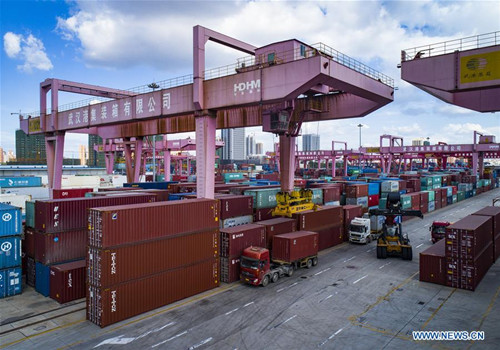Ports to have better business environment


Aerial photo taken on Aug 13, 2018 shows containers at the Yangluo port in Wuhan, capital of central China's Hubei province. [Photo/Xinhua]
The nation will further optimize the business environment at its ports to facilitate cross-border trade and promote the stable and healthy development of foreign trade, according to a recent State Council announcement.
The announcement, released on Oct 19, mapped out 20 measures to form a more dynamic, efficient, open and convenient business environment at the nation's ports. One of those moves is to reduce the supervision items in imports and exports by streamlining documents and optimizing procedures.
According to the announcement, by the end of 2018, the number of documents required to be verified for imports and exports will be reduced by more than one-third compared with 2017, and all verifications will be operated online except for documents deemed confidential, which will reduce the overall customs clearance time by one third.
"The plan has put forward specific measures to ensure the stable and healthy development of foreign trade. It will help create a stable, fair, transparent and predictable business environment at ports and further enhance China's overall ranking in terms of global cross-border trade facilitation," said Li Dawei, a senior research fellow at China Macroeconomic Institute.
"Twenty measures listed in the plan will not only play an important role in stabilizing import and export growth in the short term. In the mid and long-term, these measures will also upgrade foreign trade, drive high-quality development and enhance the country's global value chain," Li said.
By the end of 2020, compliance costs of container imports and exports will be halved compared to 2017, the announcement said, adding that by the end of 2021, the overall customs clearance time also will be halved compared with 2017.
It also decided to optimize customs clearance procedures and operations by enhancing national customs clearance integration. The efficiency of logistics services at ports will be improved, and intelligent port management should be promoted, according to the announcement.
"Since the beginning of this year, China has introduced a series of effective measures, such as tax reduction and fee reduction, to optimize the business environment at the ports and promote cross-border trade facilitation," Li Kuiwen, spokesman of the General Administration of Customs, said at a recent news conference. Such measures have effectively helped maintain the growth of foreign trade, Li added.
In the first three quarters, China's foreign trade volume remained stable despite ongoing trade disputes with the United States, according to the GAC. Goods trade increased by 9.9 percent year-on-year to 22.28 trillion yuan ($3.22 trillion) in the first three quarters.
Zhao Ping, a senior researcher at the China Council for the Promotion of International Trade Academy, said the impact of China's trade friction with the US on its overall trade situation is controllable, and the country's foreign trade is expected to continue its strong run this year.
MOST POPULAR
- 1 China to give visa-free treatment to another 9 countries
- 2 China fully opens manufacturing sector to foreign investors in landmark opening up move
- 3 China's import expo attracts record-breaking participating countries, exhibitors
- 4 China's door opening even wider to foreign visitors, businesses
- 5 China revises rules to ease foreign strategic investment in listed firms
Editors' Picks
 Infographic:
China's public holidays for 2025
Infographic:
China's public holidays for 2025
 Infographic:
Basic facts of APEC
Infographic:
Basic facts of APEC
 Infographic:
Wrapping up the 7th CIIE: Data recap
Infographic:
Wrapping up the 7th CIIE: Data recap




